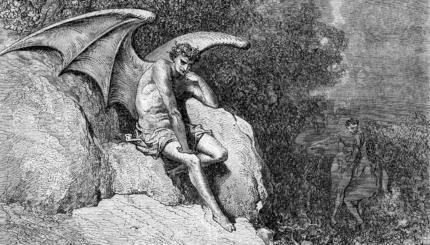The “evil eye,” ayin ha’ra in Hebrew, is the idea that a person or supernatural being can bewitch or harm an individual merely by looking at them. The belief is not only a Jewish folk superstition but also is addressed in some rabbinic texts.
The term is also sometimes used to describe evil inclinations or feelings of envy.
In several pieces of Midrash, rabbis suggest that the Evil Eye played a role in various incidents in the Torah. For example, they say that Sarah cast an evil eye on Hagar while Hagar was pregnant, causing her to miscarry before going on to become pregnant with Ishmael. Elsewhere, rabbis argue that Leah’s fertility was adversely impacted when she “became subject to the power of the evil eye” for thanking God for allowing her to bear more than a fourth of Jacob’s sons. (Rabbeinu Bahya, Bereshit 30:38:5)
In the Talmud, the rabbis say that Joseph’s descendants are immune to the power of the Evil Eye — and that:
One who enters a city and fears the evil eye should hold the thumb of his right hand in his left hand and the thumb of his left hand in his right hand and recite the following: I, so-and-so son of so-and-so, come from the descendants of Joseph, over whom the evil eye has no dominion. (Berakhot 55b)
Elsewhere in the Talmud, in Mishnah Berurah, Jews are urged to perform the Rosh Hashanah Tashlich ritual in a body of water that contains fish because “fish are incapable of being affected by the evil eye.”
And in Bava Batra 2b:9, the rabbis say it is “ is prohibited for a person to stand in another’s field and look at his crop while the grain is standing, because he casts an evil eye upon it and thereby causes him damage, and the same is true for a garden.”
Over the centuries, Jews have employed numerous superstitious practices believed to to ward off the Evil Eye, such as spitting three times after a vulnerable person’s name is uttered, or saying, when discussing some future plan, “let it be without the evil eye” (“kinehora” in Yiddish).
Jews have also sought to ward off the evil eye with amulets, particularly hamsas.
kinehora
Pronounced: kin-uh-HAH-ruh or ken-uh-HAH-ruh, Orgin: Yiddish, literally “not the evil eye.” A word said to ward off the evil eye or other bad luck, similar to the superstition of knocking wood.
Midrash
Pronounced: MIDD-rash, Origin: Hebrew, the process of interpretation by which the rabbis filled in “gaps” found in the Torah.



